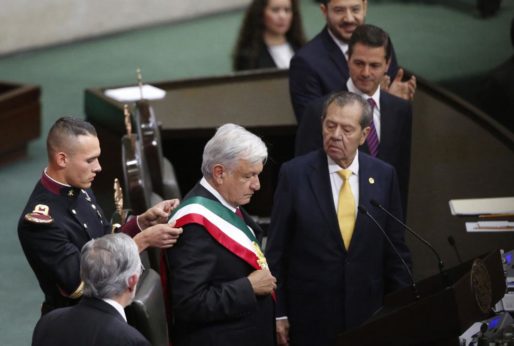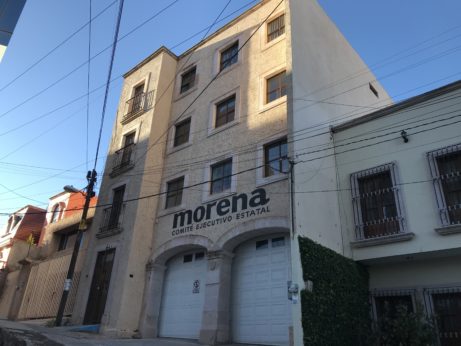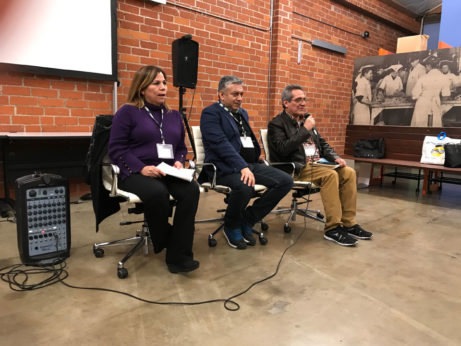
ZACATECAS, Mexico and HUNTINGTON PARK, Calif.—It’s one thing to win a victory, even an overwhelming one such as Andrés Manuel López Obrador (AMLO) achieved last July in the Mexican presidential election, busting out 30 percentage points ahead of his nearest rival.
It’s quite another thing to hold onto your base and begin the long, steady process of educating them on the issues so they will be prepared for the inevitable ups and downs of a new administration. Surely, all will not go quite as AMLO and his Morena movement dream: Some plans will be fulfilled in shining glory, while others will encounter roadblocks along the way.
Judging from experiences in the state of Zacatecas and, upon my return, in the Greater Los Angeles area, movement and labor leaders who want to see AMLO’s radical program of social transformation succeed are starting to hold community “consciousness-raising” sessions to cultivate social awareness and make for a better informed, more participatory body politic.
What about marihuano?
The Morena movement is organized nationwide all over Mexico, and also has adherents in the United States and elsewhere. On Friday, November 30, the eve of AMLO’s formal accession to the presidency, Morena held an educational session for several dozen followers in its modern State Executive Committee building on a quiet street uphill from the Alameda parkway in the center of the city of Zacatecas, the state capital. Similar informational sessions are being held throughout Mexico.
The main speaker was the lawyer (licenciado) Aquiles González Navarro, who chose as his topic “The Politics of Legalizing Marihuana.” To my surprise and edification, he framed his subject in a way very different from what one might expect in the United States.

González began with a leisurely discussion of Mexican social insecurity and the effects of a long history of North American economic and political interference, all part of preparing the left for participating in the inevitable debates to come. He traced many of the ills of Mexican society to U.S. neoliberal policy—poverty, unemployment, ignorance, drugs, violence, corruption, and impunity—recapitulating many of AMLO’s talking points both in the electoral campaign and in the next day’s inaugural speeches.
Implicating the CIA in Mexico’s drug culture, as well as the military approach to the nation’s problems, the speaker eventually came around to the 1940s presidency of Lázaro Cárdenas, who sought to decriminalize marihuana (the preferred spelling in Mexico).
Now Cárdenas was not responding to an organized community of hippies and dope smokers in trying to pass his legal reform. Rather, he saw marihuana, or hemp—-in particular marihuano, the male plant, which does not contain the psychoactive ingredients that get those who ingest them high—-as useful raw material for the textile and paper industries. He also saw henequen, once primarily used for making rope and burlap bags, as a product worth exploring for textile and paper applications.
The United States responded with an ultimatum: Either rescind the decree or the U.S. would withhold shipment of vaccines for various pandemic diseases. Cárdenas caved under this threat. And why was the U.S. so concerned? The drug war? Hardly. DuPont was about to launch its patents on nylon and did not wish to face competition from the Mexican agricultural sector.
There arose in Mexico a virtual taboo on discussing marihuana (as well as sex), thus inhibiting Mexican advancement for decades. González envisions a future where every person in the country could be given a backpack made of hemp, where medical uses of marihuana would be researched, and seeds could be used as food (he showed slides of commercial European packages of marihuana seeds). In fact, he asserted, an exception to the ban on hemp products was briefly made during World War II, when producers from the state of Sinaloa provided hemp used for making pants for American soldiers. Hemp can also be used to make sails.
Concluding with an appeal for broad reforms in the legal code, González critiqued the army mentality of seeing every social delinquent as a military enemy and called for a halt of arms shipments from the U.S. to Mexico. He also cited the Mérida Plan, or the Mérida Initiative, as an agreement sorely in need of repeal. Signed in 2008, in the waning lame-duck weeks of George W. Bush’s presidency, the agreement between the U.S., Mexico, and the Central American countries aims at cooperation to combat drug trafficking, transnational organized crime, and money laundering. Clearly, the leading force in that arrangement is the U.S., and the dominant ideology is one of militarism. It was one more way the U.S. imposed its influence on its weaker neighbors to the South.
The talk evoked much spirited comment in the discussion period that followed, showing an engaged public educating itself and preparing to participate in the larger conversations around AMLO’s proposals in the coming months and years. Another public talk was scheduled for the following Friday night.
Mexican unionists come to L.A.’s industrial zone
A similar size gathering—a few dozen—came together in Huntington Park on Tuesday night, December 11, to hear speakers from the Mexican labor movement in a so-called “Tri-national Labor Gathering.” The U.S. was represented by the host union, the United Food and Commercial Workers (UFCW) Local 770, in partnership with the UCLA Downtown Labor Center. A Canadian union representative was briefly introduced but did not speak. The entire proceedings were conducted in Spanish, with simultaneous English translation available to those who needed it.

The public community forum, “Implications of the New Administration of López Obrador in Mexico for Workers and the Labor Movement,” was designed to promote workers’ solidarity. Gaspar Rivera of the UCLA Labor Center moderated.
The participating Mexican labor leaders included: Julia Quiñónez of the Border Committee of Women Workers, Moisés Acuña of the Mexican Miners’ Union, José Humberto Montes de Oca of the 104-year-old Mexican Electrical Workers Union, Enrique Fabela of the Telephone Workers Union, and Carla Vázquez of the Rosa Luxemburg Stiftung (Foundation), sponsored by Die Linke, the German left party. Vázquez works out of the Mexico City office, one of 25 the foundation supports around the world. Rigoberto Valdez, director of organizing for UFCW 770, offered welcoming remarks.
Preceded by a sumptuous authentic Mexican dinner, the panel took place at the three-year-old Ricardo F. Icaza Workers’ Center in Huntington Park, a location chosen because of its proximity to the meatpacking and other industries in town and in neighboring working-class areas of Greater L.A. populated by immigrant laborers, many of them undocumented.
Morena is a broad coalition of left-of-center groups that lifted AMLO to the presidency. But by the very nature of coalition work, there are differences on some points, and some of these emerged either openly or in muted form Tuesday night. For example, Fabela pointed out without much elaboration, that while the vote for AMLO was a referendum for change, the union movement was not 100 percent for Morena. He may have been recalling that some unions for decades have had a close relationship to PRI, the longtime governing party. Quiñónez cited AMLO’s pledge to double the minimum wage but reminded her listeners that the existing minimum wage is so pathetically low at 88.36 pesos a day (about $4.70), that doubling it would still fall far short of a living wage.
Acuña emphasized that there is no magic wand that will transform Mexico. Workers must maintain confidence in AMLO, but the working class has to lead the change. Vázquez cautioned against an excess of emotion and spoke of the need to constantly analyze and debate developments on the ground through the appropriate prisms of labor rights, feminism, socialism, and internationalism, which are the Rosa Luxemburg Foundation’s principles.
Fabela praised the by now famous accessibility of AMLO to the general public, however, he pointed out that many leading unions were not invited to the “Toma de Protesta,” the inauguration ceremony. In former times, PRI did invite its client unions. He also observed that if neoliberalism was a betrayal of the spirit of the Mexican Revolution to favor the rich, recent pre-AMLO renewals of contracts with media giants Televisa and TV Azteca will extend almost two more decades into the future, so some salient features of neoliberalism will remain.
Vázquez pointed to contradictory signs in Mexico: Although rating number 17 in the world economy, Mexico stands at number 77 in terms of social inequality. AMLO represents a once-in-a-lifetime opportunity for change; indeed, the country had no other option. But journalists are in mortal danger, women are wantonly murdered, and corruption is as serious a problem as inequality. Morena needs to educate its base and not lose sight of the basic struggle between the people and the elite.

Montes de Oca sounded the alarm by underlining that it is not enough to have faith: It is necessary to understand exactly whom we are fighting. AMLO is not the first in Latin America to confront neoliberalism; we need to keep in mind that before he can redistribute the nation’s resources it is first required to secure them. Some reform, such as the educational system, is relatively easy, as that field is not so heavily capitalized. But reform in the energy sector is a far thornier question. “We’re in the middle of a battle,” he said. “We need not just generals, but an army. We need popular support beyond the polls. We must be organized and prepared to advance our demands. There will be confrontation.”
A couple of dozen people lined up at the mike to pose questions to the panel, though many just made lengthy impassioned declamations. Some questioned if Morena and AMLO had paid adequate attention to immigrants in the U.S. who have no representation in either country. One speaker called for a new federal Secretaría, or Department of Immigration. Some wondered what position the unions had toward the caravan and refugees, and if they were doing enough to promote democracy. Others with long memories recalled that the unions they knew in Mexico existed only to deliver votes for politicians and that union contracts were signed not to benefit the workers, but only the leaders.
Overall, the level of commentary was informed and articulate, showing the hunger for dialogue and information. Such educational forums are sure to continue as the AMLO presidency unfolds.
In the tri-national spirit, one woman declared, “Aquí y allá somos los mismos”—Here and over there we are all the same.










